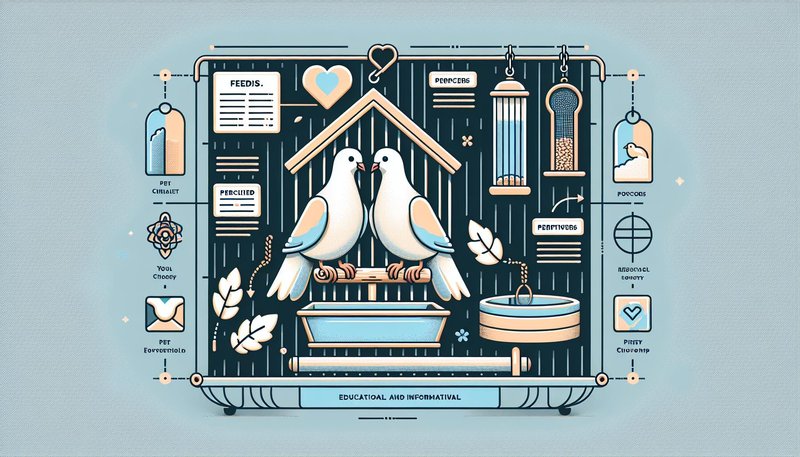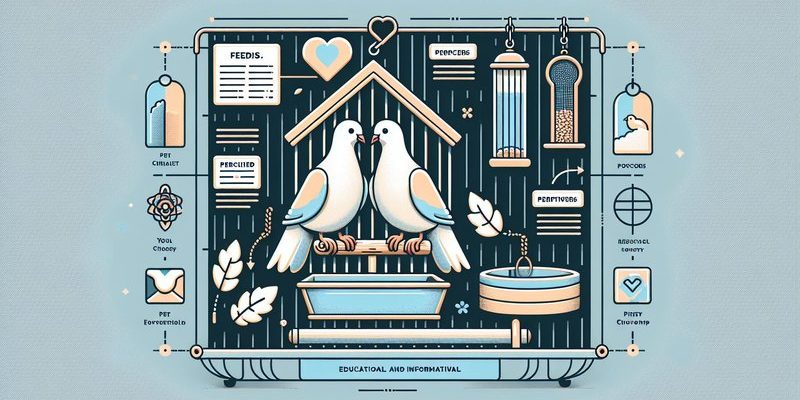
Imagine having a charming dove that coos softly in the corner of your living room, fluttering around and adding a touch of serenity to your life. Yet, along with the joy of dove companionship comes a responsibility to provide a suitable living environment, meet their care needs, and abide by local regulations regarding pet ownership. Let’s explore the ins and outs of keeping doves, including what you need to know to ensure you’re being a good pet owner.
Understanding Dove Ownership Laws
When considering keeping doves as pets, the first step is to familiarize yourself with local laws and regulations. Depending on where you live, different rules govern the keeping of birds. Some places may require permits, while others may have restrictions on certain species.
For instance, in some areas, keeping wild doves can lead you into a legal gray area, as they may be protected under wildlife conservation laws. It’s essential to check with your local wildlife agency or city council to clarify any regulations. Websites often provide a wealth of information, and a quick call can clear up any doubts.
Here’s a general breakdown of what to look for:
- Species Restrictions: Are there species you can’t keep legally?
- Permitting Needs: Do you need a permit to own doves?
- Zoning Laws: Does your residence allow for pet birds?
If you’re unsure where to start, visiting the website of local animal control or wildlife agencies can provide clarity.
Ethical Considerations of Dove Care
Beyond legality, the ethical responsibilities of keeping doves can’t be overlooked. Just like any pet, doves rely on their owners for proper care and a suitable habitat. This means more than just offering a cozy cage; you need to think about their mental and physical needs.
First, consider their social nature. Doves are flock animals and can become lonely if kept alone. Providing companionship, whether through another dove or regular social interaction with you, is vital for their well-being. Imagine how you’d feel if you were confined to a small space alone all day. A little companionship can make a world of difference.
Next, it’s important to think about their diet and environment. Doves require a balanced diet, clean water, and an appropriate cage size to fly around in. Ethical dove ownership means ensuring they have a life that reflects their natural behaviors as much as possible. Invest time in learning about their needs and behaviors to give them the best life possible.
Choosing the Right Dove Species
Doves come in various species, each with unique traits and care requirements. Popular species like the diamond dove or the mourning dove are often considered as pets. However, you should do thorough research on which type suits your lifestyle and home environment.
Ask yourself a few questions: How much space do you have? Do you want a bird that’s more social or one that’s relatively independent? Making the right choice for your situation can significantly enhance your dove-keeping experience.
Here’s a simple comparison of some popular dove species:
| Species | Size | Temperament | Social Needs |
| Diamond Dove | Small | Friendly | Social |
| Mourning Dove | Medium | Shy | Moderate |
| Ringneck Dove | Medium | Very Social | High |
Providing a Suitable Habitat
Creating a safe and comfortable habitat for your dove is essential. This means not only providing a spacious cage but also enriching their environment to mimic natural conditions as much as possible.
A good cage should be tall enough for your dove to fly short distances and should include perches, toys, and areas to hide. The materials used in the cage are important too. Avoid cages with harmful coatings or sharp edges that could injure your bird.
To spice up their environment, consider adding:
- Natural branches for perches: They mimic the birds’ natural habitat.
- Toys and puzzles: These keep their minds active.
- Shreddable materials: Such as palm leaves or paper for nesting, if you have a breeding pair.
Remember, a well-kept habitat can enhance your dove’s quality of life tremendously.
Feeding and Diet for Doves
Just like humans need a balanced diet, so do doves. They thrive on a variety of seeds, grains, and fresh fruits or vegetables. Commercial dove food can be a good base, but adding fresh meals will keep your pet healthy and happy.
You might wonder what to feed them specifically. Here are some options:
- Seed mixes: Look for ones specifically designed for doves.
- Pellets: A great supplement, ensuring they get all necessary nutrients.
- Fresh foods: Such as greens, berries, and small pieces of fruit.
Also, remember to provide clean water daily. Dehydration can lead to serious health issues, so keeping their water bowl clean and fresh is non-negotiable.
Veterinary Care and Health Considerations
Regular veterinary care is a critical part of keeping your dove healthy. Just like any pet, they can suffer from a range of health issues, from respiratory infections to nutritional deficiencies. Finding a vet who specializes in avian medicine is essential, as not all veterinarians have the knowledge required for bird care.
You might be wondering about signs of illness in doves. Keep an eye out for:
- Change in appetite: Eating less or not at all.
- Lethargy: Not being as active or social as usual.
- Physical changes: Feather loss or unusual droppings.
Regular check-ups can catch potential issues early on and ensure your dove lives a long, happy life.
Community and Resources for Dove Owners
Connecting with other dove owners can provide invaluable insights and support. There are numerous online forums, social media groups, and even local clubs dedicated to bird enthusiasts. Through these communities, you can share experiences, get advice, and learn from seasoned dove keepers.
Think about joining local bird clubs or attending avian expos. They often host workshops or seminars that cover everything from care techniques to breeding practices. Additionally, many resources are available online to help you dive deeper into dove care, welfare, and the latest research on bird keeping.
In the end, being part of a community can keep you motivated and informed while enriching your experience as a dove owner.
In conclusion, keeping doves as pets can be a rewarding venture, filled with joy and companionship. However, it’s essential to navigate the legal and ethical aspects of dove ownership carefully. By understanding the laws, ensuring proper care, and creating a nurturing environment, you can enjoy the beauty and charm of these remarkable birds in a respectful and responsible way. So, are you ready to welcome a little feathered friend into your home?

